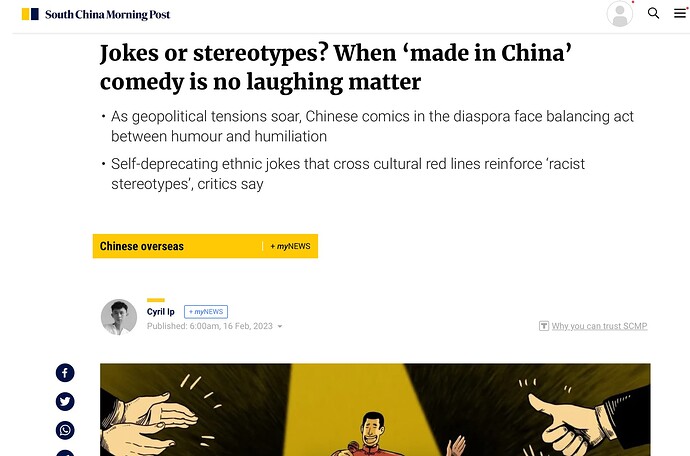-
散居海外的华人喜剧演员正在利用中国和西方之间紧张的关系作为他们喜剧的灵感。
-
这导致一批新的亚洲喜剧演员在西方获得名声和成功。
-
然而,华侨社区的一些人对这些笑话感到不快,并指责这些喜剧演员为了娱乐而放大了文化俗套,是 “种族叛徒”。
-
喜剧演员在表演种族或政治笑话时必须走一条细线,因为如果表达或接受不当,可能会产生意想不到的后果。
-
海外华人喜剧演员被他们的西方和中国粉丝期待讨论他们的种族,尽管对他们的种族应该如何在舞台上表现有不同的期望。
-
对种族内容的高度敏感,部分原因是人们对全球事务的认识不断提高,特别是考虑到中国大陆对西方媒体的接触越来越多。
-
相声仍然是一种主要的西方和男性的娱乐形式,但来自少数民族的喜剧演员随着他们声誉的增长,正在找到他们在舞台上的位置。
-
不应自动指责喜剧演员对西方华人社区的污名化,因为他们循环使用已经从新闻媒体上听到的材料。
-
Chinese diaspora comedians are using the strained relations between China and the West as inspiration for their comedy.
-
This has led to a new crop of Asian comics gaining fame and success in the West.
-
However, some in the Chinese diaspora community are offended by the jokes and accuse these comedians of amplifying cultural tropes for amusement and being “race traitors”.
-
Comedians must walk a fine line when performing racial or political jokes, as they could have unintended consequences if not delivered or received properly.
-
Overseas Chinese comedians are expected to discuss their race by both their Western and Chinese fans, albeit with different expectations of how their race should be represented on stage.
-
The heightened sensitivity towards racial content is partly caused by people’s evolving awareness of global affairs, especially given the growing access that mainland Chinese have to Western media.
-
Stand-up comedy is still a predominantly Western and masculine form of entertainment, but comedians from ethnic minorities are finding their place in the scene as their reputations grow.
-
Comedians should not be automatically blamed for the stigmatization of Chinese communities in the West, as they recycle material they’ve already heard from news media.
链接:Jokes or stereotypes? When ‘made in China’ comedy is no laughing matter | South China Morning Post
